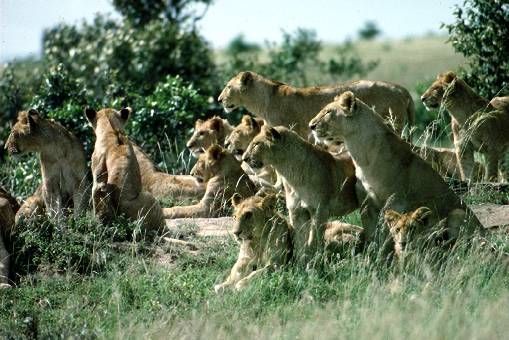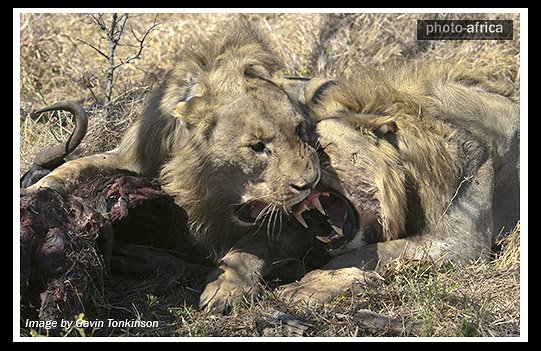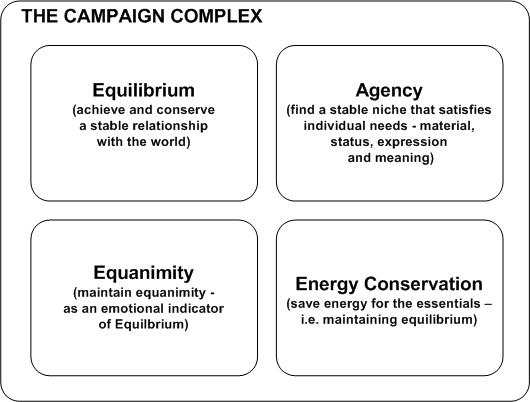Positive Change using Biological Principles, Pt 1: The Campaign Complex
This is a 4-part series which proposes a framework – the Campaign Complex – which may explain some common campaigning barriers and successes, and could inform practical strategy for community groups, campaigners and NGOs.
In Part 1, we outline the framework and its 4 component Principles, each of which may have a general adaptive purpose for all animals.
The idea of the Campaign Complex emerged from the analysis of a focus group of seasoned change agents, the loose aim of which was to explore how organisations with similar values, but different foci, might work in a more mutually-supportive way.
The discussion circle was structured around personal responses to the following three questions (written on post-its and stuck on the wall for reference during the conversation):
- 1) What motivates a change agent?
- 2) What are the barriers to a successful campaign?
- 3) What has worked at overcoming these barriers?
Despite the wide diversity of campaigning knowledge and experience in the mix – political party, banking reform, community gardening, social change, national Climate Change, Occupy, community opposition to unconventional gas – there was a surprisingly strong agreement on what had and hadn’t worked.
However, in the analysis, oft-cited barriers to success – ignorance, gullibility, apathy, carelessness and denial – seemed to offer an incomplete and superficial account of the themes.
The framework that emerged was much influenced by Arkadian’s concurrent involvement in local opposition to unconventional gas extraction, which offered first-hand experiences of positive and negative campaign dynamics, and also the author’s PhD Research, which is exploring child development from a biological systems perspective.
There follows an overview of the 4 Principles that make up the Campaign Complex, their proposed evolutionary adaptive purpose, how their effects manifest in our lives and their possible consequences for campaigns.
To close, we shall outline some of the Complex’s strategic implications for positive change.
THE CAMPAIGN COMPLEX
 Purpose. The primary purpose of the animal nervous system is to construct and maintain a stable and predictable relationship with the immediate environment.
Purpose. The primary purpose of the animal nervous system is to construct and maintain a stable and predictable relationship with the immediate environment.
Effects. Once we’ve established a workable pattern of interrelationship with our everyday world – routines / capacities / opinions / property / social relations etc. – we will tend towards experiences which build on it, and avoid those which might threaten its integrity or interrupt its flow.
Consequences. Even when we intellectually or morally appreciate the goals of a campaign, meaningful engagement may be challenging if it entails any implication of change to our ways of life and thinking, or any risk of losing face, identity, property or employment. A perceived, possibly unconscious, threat to stability could be why change agents frequently encounter dismissive, disapproving or defensive responses from their immediate and wider society.
2) The Agency Principle:
 Purpose. An individual animal’s primary directive is to negotiate and maintain the resources, territory and freedom necessary for successful survival, reproduction and self-fulfillment.
Purpose. An individual animal’s primary directive is to negotiate and maintain the resources, territory and freedom necessary for successful survival, reproduction and self-fulfillment.
Effects. We tend towards experiences which confer control over decisions important to our sense of material and social stability, which provide support and appreciation for our individual needs and expression, and avoid those where such agency is absent or at risk.
Consequences. We’re unlikely to commit to a campaign if we’ve no involvement in determining goals and activities, are insecure about the knowledge and skills it may require, or believe our contribution is insignificant or unappreciated. If we do, we may unconsciously undermine leadership and approaches, or overplay our role. On the other hand, when we lead, criticism of our good intentions may leave us feeling frustrated, confused and isolated.
3) The Equanimity Principle:
 Purpose. Stress is the animal response to a threat to equilibrium or agency. It motivates flight or fight action with the goal of achieving the equanimity indicative of a stable experience of world and self.
Purpose. Stress is the animal response to a threat to equilibrium or agency. It motivates flight or fight action with the goal of achieving the equanimity indicative of a stable experience of world and self.
Effects. We will tend to avoid stressful information and experiences, unless they relate to an immediate and unavoidable danger, and seek those which confer individual reassurance and pleasure.
Consequences. By evading distressing truths, we often grow ignorant of the need for change the emotion is supposed to motivate. Without our sponsorship, vital sources of information and action fade or are curbed. By comfort-seeking, we often fuel toxic cycles of consumption – the c21st’s default route to well-being.
4) The Energy Conservation Principle:
 Purpose. Animal behaviour largely presumes an erratic energy supply. Available resources are usually stockpiled and used frugally and efficiently to pursue equilibrium, agency and equanimity.
Purpose. Animal behaviour largely presumes an erratic energy supply. Available resources are usually stockpiled and used frugally and efficiently to pursue equilibrium, agency and equanimity.
Effects. We tend to avoid non-essential goals and tasks that entail, or might entail, unnecessary cognitive or physical energy or which someone else will tackle if we don’t, and favour those yielding maximum immediate reward for minimum effort.
Consequences. We are unlikely to engage with a campaign which implies long-term commitment, doubtful victory, a taxing work / info load, or which appears to be ticking along fine without us. On any given task, we will seek efficiencies and, given a range of ways of participating, we are likely to elect for the easiest.
STRATEGIC IMPLICATIONS OF THE CAMPAIGN COMPLEX:
 1) EQUILIBRIUM: Campaigns will have greater likelihood of success if they are perceived to be safeguarding what we collectively value and what is integral to the stability of our everyday lives. We are more likely to engage if we think we stand to lose or change more through our inaction, than our action. We are also likely to need significant practical and moral support for activities which are unfamiliar to us, no matter how basic they seem to others.
1) EQUILIBRIUM: Campaigns will have greater likelihood of success if they are perceived to be safeguarding what we collectively value and what is integral to the stability of our everyday lives. We are more likely to engage if we think we stand to lose or change more through our inaction, than our action. We are also likely to need significant practical and moral support for activities which are unfamiliar to us, no matter how basic they seem to others.
 2) AGENCY: Campaigns with common purpose, which co-develop goals, roles and actions through facilitated, collective decision-making processes are more likely to work because they give us an opportunity to express agency and feel ownership of outcomes.
2) AGENCY: Campaigns with common purpose, which co-develop goals, roles and actions through facilitated, collective decision-making processes are more likely to work because they give us an opportunity to express agency and feel ownership of outcomes.
 3) EQUANIMITY: Campaigns are most likely to motivate us if they address an immediate, common threat to equilibrium or agency, thus provoking a “fight” response. Moreover, visible evidence of support is, in turn, more likely to inspire action because “fighting” together is more likely to succeed (though it can also offer us a cover for inaction – see below).
3) EQUANIMITY: Campaigns are most likely to motivate us if they address an immediate, common threat to equilibrium or agency, thus provoking a “fight” response. Moreover, visible evidence of support is, in turn, more likely to inspire action because “fighting” together is more likely to succeed (though it can also offer us a cover for inaction – see below).
Collective action will provide further reinforcement if it also offers us opportunities for fun, enjoyment and socializing. Such activities could also mitigate the risk of campaign disintegration as the result of stress causing us to become preoccupied with our own self-preservation, and lose sight of the needs and goals of the group (the dynamics of which will be explored in Pt 2).
 4) ENERGY CONSERVATION. Simple first-step experiences, which imply no commitment but deliver rewards that resonate strongly with the other principles, are most likely to facilitate our deepening involvement. Regular “heartbeat” meetings and events can promote habits which override our excuses and inertia.
4) ENERGY CONSERVATION. Simple first-step experiences, which imply no commitment but deliver rewards that resonate strongly with the other principles, are most likely to facilitate our deepening involvement. Regular “heartbeat” meetings and events can promote habits which override our excuses and inertia.
Lastly, if our engagement tails off, we need carefully-worded unemotional feedback about the potential consequences of our inaction. If we don’t know our non-participation threatens what we value, then this principle predicts we’re unlikely to do anything about it.
So there’s the Campaign Complex in a nutshell. We hope you’ll join us next Friday for Part 2, when we shall be proposing a vital “Missing Principle” inferred from the dynamics and implications discussed here.
1 Comment
Leave a comment
Recent Posts
- Seeding a Viable Economic Alternative. Pt 3: Placing Mother Nature First
- Seeding a Viable Economic Alternative. Pt 4: Ego-as-Process
- Charlie Hebdo and the Immorality Loop
- My Top 20 Waterfalls Pt3 (S America: #2-1)
- My Top 20 Waterfalls Pt2 (S America: #7-3)
- My Top 20 Waterfalls Pt1 (Africa, Asia, Europe & N America)
- Positive Change using Biological Principles, Pt 4: Principles in Action
- Positive Change using Biological Principles Pt 3: Freedom from the Community Principle
- Positive Change using Biological Principles Pt 2: The missing Community Principle
- Positive Change using Biological Principles, Pt 1: The Campaign Complex
- Seeding a Viable Economic Alternative. Pt 2: The Principal Themes (Outcomes of a Systems Workshop at Future Connections 2012)
- Seeding a Viable Economic Alternative. Pt 1: The Action Plan (Outcomes of a Systems Workshop at Future Connections 2012)
- What I Learned from Destroying the Universe
- Why Corporate Regulation is a Socioenvironmental Necessity. Part 5 of 5: How do We Create a Diverse and Stable Economic System?
- The Root of all Evil: how the UK Banking System is ruining everything and how easily we can fix it.
- What is Occupy? Collective insights from a ‘Whole Systems’ Session with Occupy followers
- Why Corporate Regulation is a Socioenvironmental Necessity. Part 4 of 5: Why does the current Economic System tend towards Uniformity and Instability?
- Why Corporate Regulation is a Socioenvironmental Necessity. Part 3 of 5: Why does A Diverse System = A Stable System?
- Why Corporate Regulation is a Socioenvironmental Necessity. Part 2 of 5: Why does (did) Civilisation tend towards Diversity and Stability?
- Why Corporate Regulation is a Socioenvironmental Necessity. Part 1 of 5: Why do Ecosystems tend towards Diversity and Stability?






Very interesting read…..and I could completely identify with the four principles whether for myself or other areas I dabble in.
Of great use and I will send this link onwards.
Many thanks
Hnk Hnk